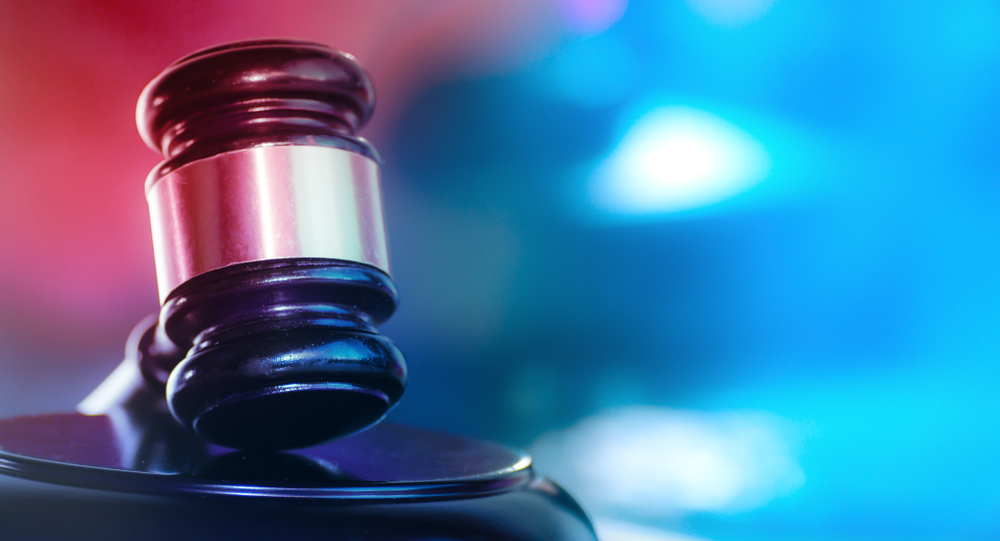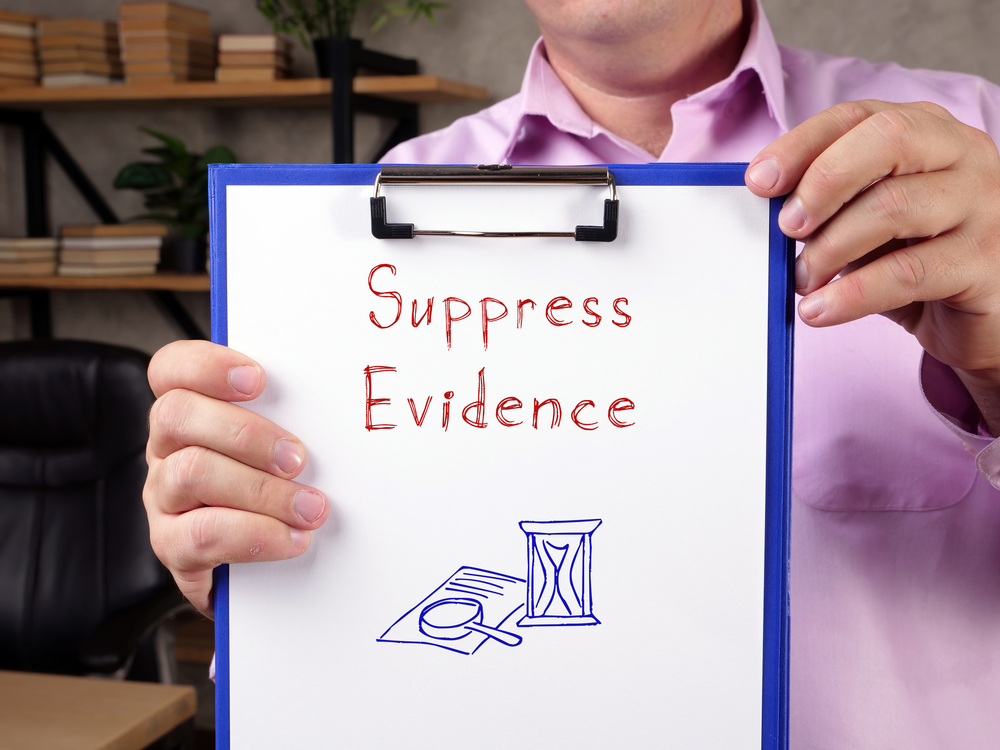If you’re dealing with a DUI, which Ohio calls an OVI, you might hear that your case is set for a Motion to Suppress. It might sound confusing, but it’s a crucial part of the legal process.
Here’s a simple breakdown of a Motion to Suppress, its role in DUI cases, and what it can mean for you.
What is a Motion to Suppress?
A Motion to Suppress is a request made by your lawyer to the court. In this request, your lawyer is basically saying, “We think the court shouldn’t admit some of the evidence in this case.”
Maybe the police collected the evidence in an unfair way or didn’t follow the law. For example, if the police didn’t have a good reason to stop your car or didn’t follow the right steps when giving you a Breathalyzer test, a defendant might challenge this evidence.
Why Does It Help in DUI Cases?

In DUI cases, police must properly collect the evidence. The law has strict rules about traffic stops, field sobriety tests, and Breathalyzer tests. Incorrectly performing any of these steps might affect your case.
Your lawyer will look at everything that happened. If they find that the police made mistakes or violated your rights, they’ll use the Motion to Suppress to try and get that evidence thrown out of your case.
What Does It Mean for Your Case?
If the court agrees with your lawyer’s Motion to Suppress, it will prevent the prosecution from using certain evidence against you in court. It can make a huge difference in your DUI case.
Without this evidence, the prosecution has less to use to prove you were driving under the influence. Sometimes, if the court throws out particularly crucial evidence, it might even lead to a complete case dismissal.
Suppressing Evidence After an Unlawful Traffic Stop
The Fourth Amendment of the U.S. Constitution protects individuals from unreasonable searches and seizures, and if law enforcement violates these rights during a traffic stop, it may be possible to suppress DUI evidence.
Your lawyer should examine the legitimacy of the traffic stop. Law enforcement must have a reasonable suspicion that a traffic violation or criminal activity is occurring to initiate a stop. If the stop lacks a valid legal basis, any evidence obtained subsequently may be inadmissible in court.
If the officer lacked a valid reason to stop your vehicle, such as swerving without clear evidence of impairment, the entire traffic stop may be unlawful.
Pretextual stops occur when law enforcement uses a minor traffic violation as a pretext to investigate other potential offenses, such as DUI. If the primary purpose of the stop was not the observed violation, your lawyer may challenge it as unlawful.
If your defense attorney believes the traffic stop was a result of racial profiling rather than a legitimate suspicion of wrongdoing, this may serve as grounds to challenge the stop’s lawfulness and the suppression of all subsequent evidence.
Why This Matters
When the court suppresses evidence, the prosecution cannot use it in court against you. It can make a difference in your DUI case. If all evidence from the traffic stop becomes inadmissible, it often leads to a case dismissal.
What Happens Next?
After your lawyer files a Motion to Suppress, a hearing will occur. It is a chance for your lawyer to explain why they think the court should bar the evidence. The prosecutor can also argue why they think the evidence is okay.
The judge will listen to both sides and then decide. If the judge agrees with your lawyer, they will suppress the evidence, which means the prosecutor cannot use it in your trial.
How a Successful Motion to Suppress Helps Your Case
A successful Motion to Suppress can be a game-changer in your DUI case.
Here’s how:
- Reduces the Evidence Against You: The most direct effect of a successful motion is that it reduces the amount of evidence the prosecution can use against you. For example, if the police didn’t have a valid reason to stop your car, any evidence they got from that stop might not be allowed in court. It can include breathalyzer test results, observations made by the officer, or anything else they discovered during the stop.
- Weakens the Prosecution’s Case: The prosecution relies on evidence to prove their case. When key pieces of evidence are inadmissible, their case becomes weaker. It can be especially critical in DUI cases where evidence like breathalyzer test results often play a significant role. Without this evidence, the prosecution might have difficulty proving that you were driving under the influence.
- Potential for Case Dismissal: If the vital evidence gets thrown out in some situations, your case can be dismissed. It happens when the remaining evidence isn’t strong enough to support the charges against you. It’s not guaranteed, but it’s possible depending on what evidence gets suppressed and how crucial it was to the prosecution’s case.
- Creates Negotiation Opportunities: Even if your case isn’t dismissed, a successful Motion to Suppress can create opportunities for negotiation. With less evidence, the prosecution might be more open to discussing plea deals or reduced charges. It can lead to a more favorable outcome for you than going to trial with all the original evidence in play.
- Demonstrates Fairness in the Legal Process: This motion also checks the legal process, ensuring your rights are protected. It shows that the court is committed to fairness, ensuring that only correctly obtained evidence is used. It is important for the integrity of your case and the legal system as a whole.
Common Misconceptions About Motions to Suppress
These common misunderstandings about motions to suppress can often lead people down the wrong legal path, and it’s important to clarify these issues to ensure a more informed perspective.
Misconception: Motions to Suppress Are Always Successful
Filing a Motion to Suppress will not automatically suppress evidence in a DUI case. In reality, the success of such motions depends on the strength of the legal arguments and the case’s specific circumstances. While they can be powerful tools, they are not guaranteed to succeed.
Misconception: Suppressing Evidence Means a Case Is Dismissed

Some think the dismissal of a DUI case will follow if they successfully suppress evidence. It isn’t necessarily true. Suppressing evidence can weaken the prosecution’s case but doesn’t automatically lead to dismissal. The case might proceed with reduced evidence or negotiations for a plea bargain.
Misconception: Anyone Can File a Motion to Suppress
Another misconception is that anyone accused of DUI can file a Motion to Suppress without legal representation. These motions require a deep understanding of the law and its nuances. Always hire an experienced DUI defense attorney to navigate this process effectively.l
Misconception: Motions to Suppress Are Quick Fixes
Some believe that filing a Motion to Suppress is a quick and easy way to get out of a DUI charge. In truth, these motions are part of a complex legal process that can take time. They involve thorough legal research, evidence gathering, and court hearings, making them far from a quick fix.
Misconception: Suppressing Evidence Means the Officer Acted Unlawfully
Successfully suppressing evidence does not necessarily mean the arresting officer acted unlawfully. It might result from a procedural error, improper documentation, or other technicalities. It’s essential to understand that the focus is on the legality of the evidence, not necessarily the officer’s conduct.
Misconception: All Evidence Can Be Suppressed
Some people believe that any piece of evidence in a DUI case can be challenged and suppressed. In reality, there are limitations to what you can suppress. For instance, evidence obtained with a valid search warrant or evidence that doesn’t violate the defendant’s rights might not be eligible for suppression.
Misconception: Suppressing Evidence Means Acquittal
There’s a misconception that the defendant is guaranteed an acquittal if evidence gets suppressed. While suppressing evidence can weaken the prosecution’s case, it doesn’t guarantee a not-guilty verdict. Other factors, such as witness testimony and legal arguments, still significantly affect the trial’s outcome.
The Process of Filing a Motion to Suppress
Let’s break down the process of filing a Motion to Suppress in a DUI case step by step, making it easy to understand for everyone.
Step 1: Consultation With Your Attorney
The first step is to consult your attorney. Your attorney will assess the details of your DUI case and determine whether there are valid grounds to file a Motion to Suppress. This initial consultation is essential as it sets the stage for the entire process.
Step 2: Gathering Evidence and Information
Once your attorney decides that filing a Motion to Suppress is appropriate, they will work with you to gather all relevant evidence and information. It may include police reports, witness statements, and other documents related to your arrest and the evidence.
Step 3: Drafting the Motion
Your attorney will draft the Motion to Suppress, outlining the legal arguments and why certain evidence should be inadmissible. This document will be filed with the court and is an integral part of the process.
Step 4: Filing the Motion
Your attorney will file the Motion to Suppress with the court handling your DUI case. It involves submitting the document to the court clerk and paying any necessary filing fees. The court will then schedule a hearing date.
Step 5: Notification to the Prosecution
Your attorney will also provide a copy of the filed motion to the prosecution. This standard procedure ensures both sides know the pending motion and can prepare their arguments for the upcoming hearing.
Step 6: Preparation for the Hearing

As the hearing date approaches, your attorney will prepare your case. It involves reviewing the evidence and legal precedents and crafting persuasive arguments for the court. It’s best to be well-prepared to increase the chances of a successful outcome.
Step 7: The Motion to Suppress Hearing
You and your attorney will appear in court on the scheduled hearing date. The purpose of the hearing is for both sides to present their arguments regarding the suppression of evidence. Your attorney will present arguments in favor of suppressing evidence, and the prosecution will counter their arguments.
Step 8: Court Decision
After hearing both sides’ arguments, the judge will decide the Motion to Suppress. The judge may rule immediately or take some time to deliberate. If the court grants the motion, the suppressed evidence cannot work against you in trial. If denied, the case will proceed with the evidence in question.
Step 9: Next Steps
Depending on the court’s decision, your attorney will advise you on the next steps in your DUI case. A successful motion can weaken the prosecution’s case, potentially leading to negotiations or a more favorable outcome. If denied, your defense strategy may need to be adjusted accordingly.
Step 10: Continuing with Your DUI Case
Your DUI case will continue whether the Motion to Suppress is granted or denied. It’s important to follow your attorney’s guidance and be ready for further legal proceedings, including negotiations, trials, or other legal strategies.
What Other Evidence Can Your Attorney Challenge?
Your lawyer can challenge the admissibility or reliability of many types of evidence, including:
- Breathalyzer and Blood Test Results: If officers failed to conduct the tests correctly, your lawyer can challenge the results. For example, if they did not calibrate the Breathalyzer correctly or handle the blood sample properly, the results might not be reliable.
- Field Sobriety Tests: If the police did not conduct the tests according to standards, or if there were other factors like bad weather or poor lighting, a defendant can challenge the evidence.
- Officer Observations: Sometimes, what an officer thinks they saw can be questioned. For example, if they say your speech was slurred, but a video shows it wasn’t, you can challenge that observation.
- Procedures and Protocols: If the police didn’t follow the proper steps when stopping you, testing you, or arresting you, this could be a reason to suppress evidence. It includes making sure they had a legal reason to stop you in the first place.
- Statements Made by the Driver: If police didn’t read your Miranda rights before you talked or pressured you into saying something, these statements can sometimes be inadmissible.

Seek Help from a Criminal Defense Attorney Immediately
A Motion to Suppress can be an essential step in your DUI case. It’s about making sure everything is done fairly and by the law.
If you’re in this situation after a DUI, talk to your lawyer about it. They can explain how a Motion to Suppress works in your case and what it can mean.
Remember, every DUI case differs, so understanding what’s happening in yours is the key to handling it the best way possible.
